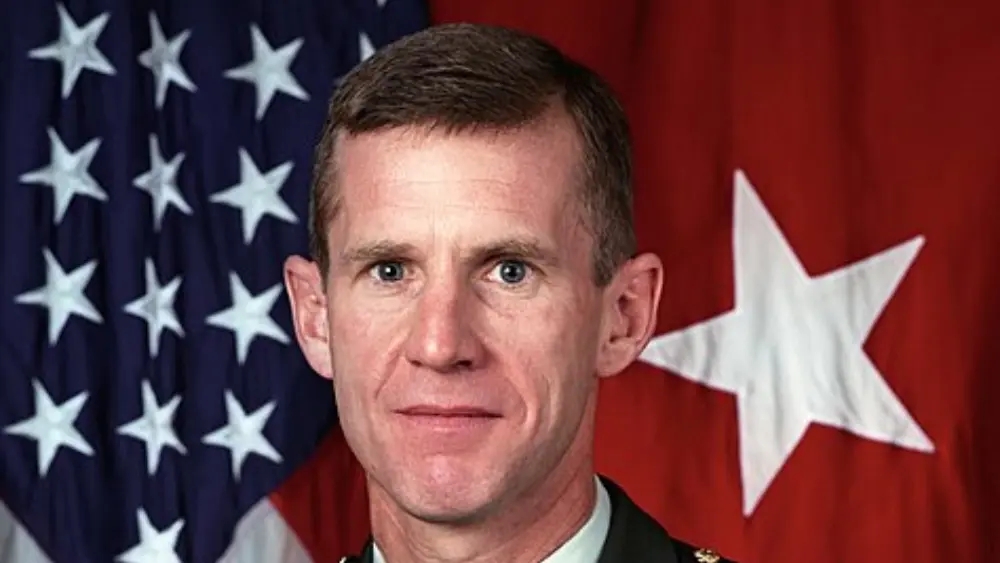Stanley A. McChrystal, born on August 14, 1954, in Fort Leavenworth, Kansas, is a highly decorated American military officer and strategist known for his innovative and adaptive approach to modern warfare.
Early Life and Military Education
Stanley McChrystal’s formative years were deeply influenced by his family’s longstanding military tradition. Raised patriotically, he was destined for military life, driven by a strong sense of duty in a supportive environment. This familial influence led him to pursue a path of military education and service. A turning point was his admission to West Point, a prestigious moment in his journey. At West Point, McChrystal also excelled academically and showcased leadership qualities that defined his future military career. His academy years set the foundation for his extraordinary rise in the U.S. military’s highest echelons.
McChrystal’s military education and early experiences shaped his character, preparing him for a demanding career in the armed forces. His steadfast commitment and unwavering sense of duty fueled a remarkable ascent, leaving a lasting legacy in military history. McChrystal’s path from West Point to military leadership showed commitment to principles learned in formative military education, with challenges and triumphs.
Stanley A. McChrystal: Special Forces and Leadership
McChrystal transformed his military career by joining the Special Forces, known as the Green Berets, marking a pivotal decision. This choice marked a pivotal shift, propelling him into elite units for unconventional warfare and counterterrorism. His Special Forces service demonstrated unwavering dedication to addressing complex, high-stakes military challenges. In a challenging field, McChrystal’s leadership and strategy made him a standout force in special operations.
McChrystal’s tenure in the Special Forces not only honed his military expertise but also cultivated his leadership capabilities. Green Beret service molded him into a capable commander, prepared for leading elite units in complex, high-pressure modern warfare. Special Forces service honed skills, shaping his illustrious military career. Rising through the ranks, he assumed influential roles in the U.S. military.
Innovations in Counterterrorism
Stanley A. McChrystal played a key role in countering terrorism, notably in Afghanistan and Iraq, where he faced threats from Al-Qaeda and the Taliban. McChrystal’s leadership and strategic thinking were instrumental in driving forward innovative approaches to counterterrorism. His leadership introduced innovative strategies against insurgents and high-value targets, revolutionizing tactics for tackling these challenges during his tenure.
One of McChrystal’s key contributions to counterterrorism efforts was his emphasis on capturing or neutralizing high-value targets. This approach aimed to disrupt the leadership and operational capabilities of terrorist organizations, weakening their ability to carry out attacks. Additionally, his strategies focused on the importance of disrupting insurgent networks and denying them safe havens, effectively dismantling their operational infrastructure. McChrystal’s innovative thinking and willingness to adapt to the dynamic nature of modern warfare played a crucial role in enhancing the effectiveness of counterterrorism operations, showcasing the transformative impact that strategic leadership can have in the fight against terrorism.
Stanley A. McChrystal: Joint Special Operations Command (JSOC)
As Stanley A. McChrystal ascended through the ranks of the U.S. military, his exceptional leadership abilities became increasingly apparent. His career reached a pinnacle when he assumed the role of commander of the Joint Special Operations Command (JSOC). In this critical position, McChrystal was entrusted with overseeing some of the most sensitive and classified military operations conducted by the United States. The scope of his responsibilities within JSOC extended to a wide range of covert and high-stakes missions, often carried out by elite special operations forces.
Under McChrystal’s leadership, JSOC undertook a number of significant operations, with one of the most notable being the capture of Saddam Hussein, the former President of Iraq. This high-profile success underscored McChrystal’s strategic acumen and his ability to coordinate complex and covert military efforts. His tenure at the helm of JSOC demonstrated his capacity to manage and execute operations of the utmost importance to national security, solidifying his reputation as a military leader of exceptional skill and effectiveness.
The McChrystal Way: A Shift in Military Culture
Stanley McChrystal’s legacy within the U.S. military extends far beyond his accomplishments in the field. He is renowned for initiating a profound transformation in the military’s traditional hierarchical structure, championing a more agile, networked, and adaptive approach. At the core of this transformation was McChrystal’s innovative leadership style, which stood in stark contrast to conventional military command structures.
Central to McChrystal’s leadership philosophy was the emphasis on open communication, fostering a culture of transparency and collaboration among his teams. He recognized that in the fast-paced and complex world of modern warfare, centralized decision-making could be a liability. Instead, he advocated for decentralized decision-making, empowering those closest to the frontlines with the authority to adapt and respond rapidly to evolving situations. McChrystal’s leadership approach not only improved the efficiency of military operations but also allowed for greater adaptability in the face of unpredictable challenges. His legacy as a pioneer in reshaping military culture continues to influence leadership thinking well beyond his tenure in the armed forces, emphasizing the importance of agility and collaboration in the modern era of warfare.
Stanley A. McChrystal: Commander in Afghanistan
In a critical juncture of the U.S. military’s involvement in Afghanistan, Stanley A. McChrystal was appointed as the commander of U.S. and NATO forces in the country in 2009. Tasked with navigating the complex and challenging environment of the Afghan conflict, McChrystal developed a comprehensive strategy that would shape the course of the mission. His strategy was multifaceted, encompassing a surge in troop levels to bolster security and control. But this extended far beyond mere military operations. McChrystal placed a significant emphasis on protecting Afghan civilians, recognizing that winning the hearts and minds of the local population was essential for long-term success.
Under McChrystal’s leadership, the mission in Afghanistan sought to counter the insurgency and lay the groundwork for stability in the region. His approach reflected a commitment to a holistic strategy that acknowledged the intricate interplay of military, political, and humanitarian factors on the ground. McChrystal’s Afghan leadership showcased adaptability and a comprehensive approach, surmounting complex challenges to achieve mission objectives in evolving dynamics. His Afghan service reshaped the U.S. military’s modern warfare approach and counterinsurgency operations, leaving an enduring impact.
Retirement and Contributions Beyond the Military
Following his retirement from the military, Stanley A. McChrystal remained deeply committed to making meaningful contributions to national security. His impact extended beyond his military service through his work as a sought-after speaker and author. McChrystal’s memoir, “My Share of the Task,” offered a unique window into his leadership philosophy and experiences in the military. In this book, he shares insights on modern warfare, innovative leadership, and lessons from his distinguished career.
Moreover, McChrystal, a speaker and author, inspires and educates on leadership, teamwork, and global security challenges in various forums. He shared valuable insights, benefiting military pros and leaders in diverse fields facing complex, fast-changing environments. McChrystal’s contributions beyond the military underscored his enduring commitment to service and the important role he played in shaping the discussions and strategies related to national security in the post-military phase of his career.

Stanley A. McChrystal: Legacy and Influence
Stanley McChrystal’s legacy firmly rests on his transformative leadership and pioneering strategies that fundamentally reshaped modern warfare. Throughout his military career, he emphasized the paramount importance of adaptability in the face of evolving threats and challenges. His leadership fosters open communication, collaboration, and decentralized decision-making, showcasing the value of team expertise. McChrystal demonstrated the importance of technology and intelligence sharing in 21st-century warfare, emphasizing counterinsurgency and counterterrorism.
McChrystal’s ideas, post-retirement, profoundly influenced military doctrine and leadership practices, extending far beyond his active service. His focus on adaptability and flexible military operations is vital in today’s security landscape. McChrystal’s legacy guides military leaders in addressing evolving threats and conflicts of the modern era. His lasting influence highlights visionary leadership’s role in shaping military history and strategies for national security protection.











